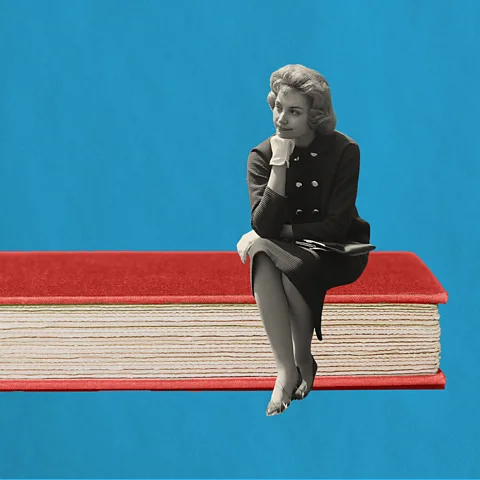
 Getty Images/ BBC
Getty Images/ BBC
"Bibliotherapy" has been soaring in popularity as a means of improving people's wellbeing. But getting it right depends on the book, and the person.
In the summer of 2017, Elizabeth Russell was going through a rough patch. It was during a difficult divorce, involving her two young teenagers, while she was still in the throes of a long-term depression. "It was just a really, really stressful time," recalls Russell, a teacher and librarian at an elementary school in Connecticut, US.
But then on the internet she came across something called "creative bibliotherapy", where a tailored recommendation of fiction is offered with the aim of improving mental health. The name Ella Berthoud, a bibliotherapist based in Sussex, UK, who co-wrote the book The Novel Cure about such literary remedies, kept popping up. Russell – an avid reader – immediately wanted to try it out.
After quizzing Russell on her reading habits and interviewing her about her challenges, Berthoud sent her a list of book recommendations relevant to her life, many featuring characters navigating tough marital decisions, like George and Lizzie by Nancy Pearl. "I just was blown away," Russell recalls. Learning from the lessons and mistakes of fictional characters helped her process what she was going through and made her feel less alone. "It opened up something in me that needed to be opened and needed to heal," she says.
In the UK and elsewhere, bibliotherapy – which also includes recommendations for non-fiction and self-help literature – has been soaring in popularity as a means of improving people's wellbeing, help navigate tough life decisions, and even to treat specific mental health conditions. (Read BBC Culture's recommendations on homesickness and resilience.)
While the benefits of self-help literature are well documented, advocates of fiction-based or "creative bibliotherapy" claim similar advantages. They argue that immersing oneself in rich, simulated worlds – often reflective of real-life experiences – can help readers process emotions, discover coping strategies, or simply provide momentary escape from their everyday woes.
As two researchers wrote in a 2016 paper in The Lancet, immersion in great literature can "help relieve, restore, and reinvigorate the troubled mind – and can play a part in relieving stress and anxiety, as well as other troubled states of mind". Considering the shortage of affordable mental health services in many countries, the idea that fiction can offer support is appealing.
As anyone who has ever read and loved a work of drama, poetry or fiction can attest, stories have powerful effects on our minds and emotions. But that doesn't mean that any kind of fiction boosts mental health for everyone. Several experts interviewed for this article worry about what they see as an overhyped promise of creative bibliotherapy in treating specific mental health conditions, where they say the scientific evidence is still rather thin. In fact, research suggests that certain books can even be harmful.
Rather, the existing research paints a more nuanced picture, suggesting that fiction can help boost general wellbeing, but it depends a lot on the person, the book and how they engage with it, says James Carney, a computational cognitive scientist at the London Interdisciplinary School.
"There's this idea that books are this cultic object that are going to make everything better," Carney says. "I think for a certain number of conditions and for a certain type of personality, it can be the case, but the idea that they're a universal medicine is just simply false."

 Getty Images/ BBC
Getty Images/ BBC
Some people report great advantages from reading fiction to help with major life events (Credit: Getty Images/ BBC)
Some trace the origins of bibliotherapy to World War One, when fiction and non-fiction books were used to ease soldiers' suffering and trauma. But the idea made a return in the 1990s, Carney says. Today it takes many forms – from bibliotherapists like Berthoud who offer tailored recommendations for £100 ($130) per session, to some GPs who point some of their patients to fiction, like Andrew Schuman. He's an NHS physician who advises the bibliotherapy charity ReLit and co-wrote the 2016 Lancet paper about the benefits of bibliotherapy.
While fiction bibliotherapy isn't a substitute for other treatments, "in conjunction with other therapies, it can be a massively powerful, boosting therapy", Schuman says. A benefit compared with other therapy types, Russell adds, is that people can do it on their own time, approaching their books when they feel emotionally ready and putting them down if they're overwhelmed.
Since 2013, the UK non-profit The Reading Agency's Reading Well programme has been curating book lists for people with conditions like dementia or depression. These lists are hand-picked and reviewed by experts and people with lived experiences of those conditions, says Gemma Jolly, the organisation's head of health and wellbeing.
Jolly says the goal is to guide people to genuinely helpful titles, especially given the overwhelming number of books about mental health and what she perceives as widespread snobbery around what qualifies as "good" literature. By partnering with local libraries in England and Wales, the programme has facilitated loans of over 3.9 million books since its inception, she says. Even some UK health agencies have taken note of bibliotherapy: in certain cases, such as eating disorders, self-help books are recognised as a therapeutic tool in clinical guidelines. It's worth noting that, like fiction recommendations, not all self-help books tailored to a condition or life stage are going to be beneficial and effective for all patients – and you should consult your GP if you have specific health concerns.
Yet the evidence that reading helps mental health is complicated. Scientists have observed that, compared with non-readers, people who read regularly for pleasure tend to be less stressed, depressed and lonely, more socially connected and confident, and perhaps even live longer, as the psychological scientist Giulia Poerio of the University of Sussex in the UK summarised in a 2020 article. But, Poerio asks, "is it actually that reading fiction is improving wellbeing, or is it just the case that people with better wellbeing tend to be people who read fiction?"
For many self-help books – which some experts describe as essentially self-guided therapy – the benefits are clear, Poerio says. One 2004 study, for instance, found that self-help books can help people with anxiety and depression, while a 2006 study on patients with eating disorders found that self-help was similarly effective as other psychological therapies in reducing binging, purging and symptoms of depression.
But the evidence is shaky when it comes to treating specific mental health conditions. Some experts have theorised that reading about characters with our own lived experiences allows us to identify with them and experience a cathartic moment when the characters overcome challenges, which we can then emulate in our own lives, explains Emily Troscianko, a literary scientist at the University of Oxford.
But there is little research on whether this actually happens, she says. In her view, "I think [it's] so simplistic and clearly not what's happening a lot of the time when people are reading about difficult experiences that have some similarity to their own," she says.

 Getty Images/ BBC
Getty Images/ BBC
For some health conditions, reading fiction tailored to that condition can cause harm rather than help (Credit: Getty Images/ BBC)
Anecdotally, many people say they feel that fiction has helped with their mental states; 81% of people who took part in The Reading Agency's 2022 annual survey said their Reading Well book helped them better understand their health needs. "Making me realise I'm not alone, … knowing how I can help myself: those kinds of things come out most often from the surveys," Jolly says.
But proving that creative bibliotherapy can help treat mental health disorders would require large studies for each condition, where participants reading a novel are compared with those given a placebo, Carney says. The existing research doesn't meet that standard, he says. In the case of post-traumatic stress disorder, for instance – a condition where some experts believe that fictional worlds could be especially useful in allowing patients to process emotions that may otherwise feel threatening – one 2017 review concluded that there weren't any high-quality studies to prove beneficial effects.
Literature is complicated. Human beings are complicated, and so why wouldn't you expect the effects also to be complex and nuanced? – Emily Troscianko
And, worryingly, some research has found that certain types of fiction can cause harm. In a 2018 study, Troskianko collaborated with the UK eating disorder charity Beat to survey almost 900 people, most of whom had experienced an eating disorder. They were asked how reading fiction books had affected their mood, self-esteem, diets and exercise habits and how they felt about their bodies. Surprisingly to Troscianko, when people recalled reading books featuring characters with eating disorders, it tended to worsen their symptoms. "If you've got an eating disorder, you're likely to at least perceive that the effects of reading that stuff for yourself were negative," she says. Worryingly, about a dozen participants said they even actively sought out such books, she adds.
Troscianko speculates that these books trigger the same ill feelings that drive eating disorders, such as competitiveness around each other's bodies and eating habits. Other research she's done suggests that people with eating disorders struggle to focus on texts that are not relevant to their condition. Ultimately, "the only stuff that you can focus on is actually just drawing you further into that obsessive world of narrow obsessions," she says. "This is one reason why I get frustrated with the quite blithe attitude of, 'reading books about stuff must always be helpful' because, well, it just depends on the books. Literature is complicated. Human beings are complicated, and so why wouldn't you expect the effects also to be complex and nuanced?"
Carney suspects that people with addiction may be similarly triggered by novels featuring characters with substance abuse habits, which often tend to glamorise addiction, Carney says. Meanwhile, Schuman, the NHS doctor, stresses that he only discusses fiction with patients he knows well, and that he'd never recommend it for people in the grip of a psychotic illness or who are having suicidal thoughts – which he says could be harmful but also inappropriate and unhelpful, possibly undermining patients' trust in doctors.
The Reading Well programme is mindful of these kinds of nuances, Jolly says. For example, in light of the research that fictionalised accounts of certain conditions could be detrimental, The Reading Agency developed a list of generally mood-boosting, uplifting books for people who want to escape from any condition or experience they’re going through. The Reading Well recommendations for adults with eating disorders only include books that offer practical support and not fictionalised accounts relating to eating habits and body image (although the reading lists for teens do include such books, based on feedback from health professionals and young people who wanted more personal stories, Jolly says).
The Reading Well programme has also removed fictionalised stories about dementia after feedback from patients who said they prefer real-world accounts that better capture the nuances of the condition. Jolly acknowledges that books aren't the solution for everyone. "We always say it's not a one size fits all," she says. "It's about having an additional tool that might work for some people."

 Getty Images/ BBC
Getty Images/ BBC
Discussing a book with other like-minded people can bring even more benefits than simply reading alone (Credit: Getty Images/ BBC)
None of this is to say that fiction can't help improve certain conditions. One small study tracking two groups of up to eight people with depression reported better mental health over a year in which they attended group readings of poetry and fiction. Carney suspects that certain kinds of fiction could be helpful for people with anxiety which, at its core, is driven by unpredictability. He suggests that reading fiction featuring predictable character types – like a lot of 19th-Century, Sherlock-Holmes-type stories – could be helpful, "because you're essentially flooding the world with evidence that the world is predictable".
Outside the context of treating specific conditions, reading fiction, drama or poetry could help boost general mental wellbeing. For instance, people with chronic pain who took part in a reading-aloud programme hosted by the UK charity The Reader Organisation reported they felt a sense of shared community, improvements in mood and quality of life.
Such wellbeing boosts may depend on how people engage with books. In one of Poerio's studies, she and her colleagues had 94 senior-aged people listen to audiobooks that they had selected from a list of popular fiction and non-fiction books. Remarkably, even two weeks after the programme, participants reported an improvement in their wellbeing and felt their lives to be more meaningful – but only those people who said they had engaged deeply with, and appreciated, their book. "When people were emotionally engaged with the content of the book – it was transporting them, they were feeling absorbed, it resonated with them, it had a lasting impression on them – that's where we saw benefits to wellbeing," Poerio says.
Carney agrees that merely giving people a novel won't have much effect; his research suggests that reflecting on books afterwards – especially together with other people – provides a much bigger wellbeing boost. Discussing literature gives people a way to think about distressing things that doesn't impinge on their wellbeing, Carney says. "When you're reading fiction, you're not bothered by Heathcliff or what Heathcliff's going to do, because Heathcliff is insulated from you by the fact that he's not real. Fiction gives you a way to rehearse all these difficult, challenging social scenarios," Carney says. And "if you can do that with other people, it makes it more real, it makes it more impactful".
For people wanting to try out bibliotherapy for themselves, Carney recommends trying to find a club for group discussions. Jolly recommends public libraries, where you can try lots of books for free – and if a book isn't resonating with you, pick up another one instead, try something shorter, or a different genre like poetry. And if reading isn't for you, Poerio adds, maybe there are other ways to improve wellbeing, like music or visual art. "If you feel it's helping you, if you're feeling the benefit… you'll want to carry on," Schuman says. "But if it feels unhelpful or intrusive, then [you] should feel completely at liberty to stop at any point."
As for Russell, she's convinced that bibliotherapy offers a path to better mental health and has done a session with Berthoud several times since her first appointment. She's even bought her friends bibliotherapy vouchers, and is using it to help her students, too, selecting books that discuss immigrant experiences, themes of loss, or other hardships. "I think the biggest point of it is so you don't feel so alone," she says. "You can take a deep breath and say, I'm not on this journey by myself."
* All content within this column is provided for general information only and should not be treated as a substitute for the medical advice of your own doctor or any other health care professional. The BBC is not responsible or liable for any diagnosis made by a user based on the content of this site. The BBC is not liable for the contents of any external internet sites listed, nor does it endorse any commercial product or service mentioned or advised on any of the sites. Always consult your own GP if you're in any way concerned about your health.
--
For trusted insights into better health and wellbeing rooted in science, sign up to the Health Fix newsletter, while The Essential List delivers a handpicked selection of features and insights.
For more science, technology, environment and health stories from the BBC, follow us on Facebook, X and Instagram.








 English (US) ·
English (US) ·